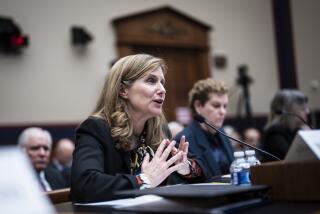Joseph B. Platt dies at 96; founding president of Harvey Mudd College
- Share via
Launching a new college would “clearly be a great adventure but so is jumping off a bridge,” physicist Joseph B. Platt wrote decades after accepting the challenge in 1956 to become the founding president of Harvey Mudd College in Claremont.
Humor was a continual resource for Platt, known for singing silly scientific ditties to teach his students, but so was consensus building. His ability to lead by suggestion helped him place the school “on a road to success,” according to George I. McKelvey, director of development when the school opened in 1957.
Of the private college’s beginnings, Platt told The Times in 1987: “It was by no means clear … that things would fall into place. We were able to get people of great stature on our faculty, and it took real courage and commitment on their part to come to a place nobody heard of.”
When Platt stepped down in 1976, Harvey Mudd was considered one of the nation’s top science and engineering colleges, a distinction that remains true today.
Platt, who was 96, died Tuesday at his Claremont home after a period of declining health, announced a daughter, Ann Platt Walker.
“He had a profound impact on all our lives here … thanks in large part to his vision and incredible energy,” Maria Klawe, the college’s current president, said in a statement. “Joe developed the mission … that we embrace today — to prepare socially responsible engineers and scientists in an educational culture of collaboration and fun.”
From 1976 to 1981, Platt served as president of what is now Claremont Graduate University, one of the seven schools in the consortium of Claremont colleges. Harvey Mudd, named for a benefactor and former board member, was the fifth of those schools. Platt continued to teach there well into his 90s.
When Platt was recruited to lead the nascent college, he was a highly respected teacher and physicist at the University of Rochester, where he helped design a synchrocyclotron, a powerful particle accelerator that he used to research atoms.
Harvey Mudd was one of the few privately supported science and engineering colleges to be founded in the 20th century, according to Platt, who told The Times in 1987 that one of its goals was to develop “the technical leadership of the next generation.”
He was one of three administrators when the school opened in September 1957 with seven faculty members, 48 students and one dormitory. Within a decade, there were nearly 300 students and 43 faculty members.
“The college of today, recognized nationally as a ‘producer’ of future engineering and science PhD graduates, owes its intellectual wealth and its prominence, more than any other, to this remarkable leader,” Eugene Hotchkiss, a Harvey Mudd colleague who became president of Lake Forest College in Illinois, wrote in the foreword to Platt’s 1994 book, “Harvey Mudd College: The First 20 Years.”
Those who signed on early found Platt’s “courage contagious,” Hotchkiss wrote. “With his leadership, they dared to build a new and different curriculum.”
Joseph Beaven Platt was born Aug. 12, 1915, in Portland, Ore., and grew up in Rochester, N.Y.
Between his freshman and sophomore years at the University of Rochester, Platt served in the merchant marine in the South Atlantic. While standing watch at night, he decided to pursue a career teaching physics, he later said.
After graduating with a degree in the subject in 1937, he earned a doctorate in physics in 1942 from Cornell University and joined the University of Rochester faculty.
He spent much of World War II at the Massachusetts Institute of Technology developing radar devices to help the military. After the war he returned to the University of Rochester, but he took a two-year leave in 1949 to oversee physics research for the Atomic Energy Commission.
Platt met Jean Ferguson Rusk, a mathematician who worked at Polaroid, in 1945 and married her the next year. His survivors include his wife; daughters Ann Platt Walker of La Jolla and Elizabeth Platt Garrow of Willowbrook, Ill.; and four grandchildren.
Services are private. The college is planning a public celebration for fall.
“It took me a while to realize my father was different from most fathers I knew,” Walker told the Harvey Mudd magazine in 2005. “I took his eclectic repertoire for granted. It never occurred to me that few kids were sung to sleep” with songs about physics “with soothing choruses like ‘round and round and round go the deuterons.’ ‘’
In the classroom, Platt similarly held court, picking up his guitar and warbling such tunes as “The Fitzgerald-Lorentz Contraction,” an ode to a physical phenomenon that begins:
There once was a sprinter in action
Who lost his last race by a fraction.
When he came to the tape
He had altered his shape
By the Fitzgerald-Lorentz Contraction.
More to Read
Start your day right
Sign up for Essential California for the L.A. Times biggest news, features and recommendations in your inbox six days a week.
You may occasionally receive promotional content from the Los Angeles Times.




















































